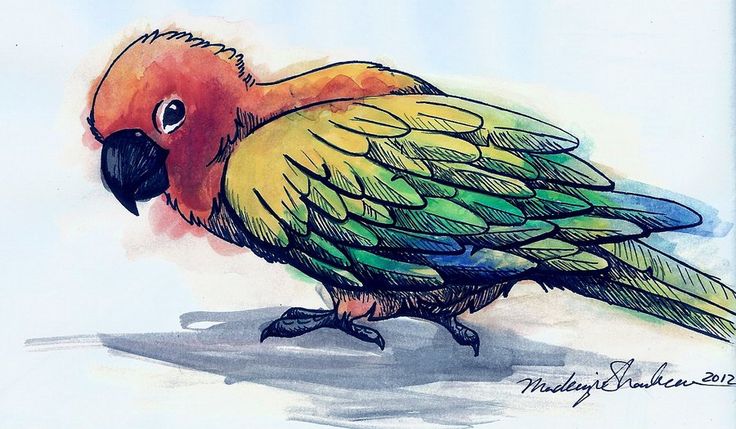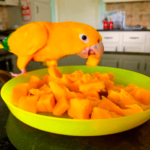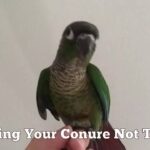Yes, Sun Conures are messy birds. They often scatter food and feathers around their cage.
Sun Conures are vibrant and social birds, making them popular pets. Their colorful plumage and playful nature attract many bird enthusiasts. Despite their charm, they can be quite messy. Owners often find food, feathers, and droppings scattered around their living spaces.
Regular cleaning is essential to maintain a healthy environment for both the bird and the owner. These birds also require mental stimulation and social interaction to thrive. Proper care and attention can mitigate the mess, ensuring a happy and healthy pet. Understanding their behavior helps potential owners make informed decisions.
Credit: www.quora.com
Introduction To Sun Conures
Sun Conures are vibrant and lively birds that make great pets. They are popular for their colorful feathers and friendly personalities. These birds are native to South America and are often found in tropical forests. Known for their playful nature, Sun Conures bring joy to many households. But, they are also known to be a bit messy.
What Are Sun Conures?
Sun Conures, also known as Sun Parakeets, belong to the parrot family. Their scientific name is Aratinga solstitialis. These birds are medium-sized, measuring about 12 inches in length. They have a lifespan of up to 30 years, making them a long-term commitment. Their bright yellow, orange, and green feathers make them easy to spot.
- Size: 12 inches
- Lifespan: Up to 30 years
- Scientific Name: Aratinga solstitialis
- Origin: South America
Popular Traits
Sun Conures are known for their vocal abilities. They can be quite loud, especially in the morning and evening. These birds are very social and enjoy interacting with their owners. They are curious and love to explore their surroundings. Sun Conures also have a playful nature, often engaging in games and activities.
- Vocal Abilities: Can be loud
- Social Nature: Enjoys human interaction
- Curiosity: Loves exploring
- Playfulness: Engages in games
Despite their many positive traits, Sun Conures can be messy. They tend to scatter food and feathers around their cage. Regular cleaning is necessary to keep their environment tidy. These birds also enjoy shredding toys, which can add to the mess. Understanding these traits can help you decide if a Sun Conure is the right pet for you.

Credit: www.allpetbirds.com
Housing Sun Conures
Sun Conures are vibrant and active birds. Providing them with a suitable home is crucial. A good home keeps them happy and healthy. Let’s explore the best housing options for Sun Conures.
Cage Requirements
A spacious cage is essential for Sun Conures. They need room to move and play. The cage should be at least 24 inches wide, 24 inches deep, and 30 inches high. This gives them enough space.
Include perches, toys, and food bowls in the cage. Perches help them exercise their feet. Toys keep them entertained. Food bowls should be easy to clean.
Ensure the cage has horizontal bars. Sun Conures love to climb. Horizontal bars make climbing easier.
Indoor Vs. Outdoor
Sun Conures can live both indoors and outdoors. Each option has its pros and cons.
| Indoor | Outdoor | |
|---|---|---|
| Pros |
|
|
| Cons |
|
|
Choose the best option for your Sun Conure. Consider their safety and comfort.
Daily Care Routine
Sun Conures are vibrant, playful birds. They need a consistent daily care routine. This routine ensures their health and happiness. Here, we explore their daily care needs in detail.
Feeding Habits
Sun Conures have specific feeding habits. They thrive on a balanced diet.
- Fresh fruits and vegetables
- High-quality pellets
- Occasional seeds and nuts
Ensure fresh water is always available. Change their water bowl daily.
Cleaning Needs
Sun Conures can be messy. They scatter food and feathers.
Daily cleaning tasks include:
- Wiping down perches and toys
- Removing uneaten food
- Changing cage liners
Weekly deep cleaning tasks:
- Scrubbing the cage
- Cleaning food and water dishes
- Disinfecting toys
A clean environment keeps your Sun Conure healthy.
Messy Behaviors
Sun Conures are vibrant, playful birds, but they can be quite messy. Their messy behaviors include feather shedding and food spillage. Understanding these behaviors can help you manage their mess effectively.
Feather Shedding
Sun Conures shed feathers regularly. This is a natural process called molting. During molting, feathers can scatter all over your home. You might find feathers on furniture, floors, and even on clothes.
To manage feather shedding, vacuum regularly. Use a handheld vacuum for small areas. Place a bird-safe air purifier nearby to reduce airborne feathers. Grooming your Sun Conure can also help. Gently mist your bird with water to ease molting.
Food Spillage
Sun Conures love to play with their food. They may toss seeds and pellets out of their cage. This can create a mess around their living area. Food spillage can attract pests like ants and rodents.
To minimize food spillage, use a cage with a seed guard. Place a mat or tray under the cage to catch fallen food. Clean the cage and surrounding area daily. Offer food in small amounts to reduce waste.
| Messy Behavior | Management Tips |
|---|---|
| Feather Shedding | Vacuum regularly, use air purifier, groom your bird |
| Food Spillage | Use a seed guard, clean daily, offer small food portions |
By understanding these messy behaviors, you can enjoy your Sun Conure while keeping your home clean. Proper management makes a big difference.
Noise And Vocalization
Sun Conures are known for their vibrant colors and lively personalities. But their noise levels can be a concern for many potential bird owners. Understanding their vocal behaviors can help you decide if they are right for your home.
Volume Levels
Sun Conures have a reputation for being loud. Their calls can reach 90 decibels, which is similar to the sound of a lawnmower. They often use their voices to communicate with their flock or express their emotions.
To manage their noise, provide them with plenty of toys and social interaction. Keeping them entertained can reduce excessive screaming. A happy Sun Conure is usually a quieter one.
Communication Patterns
These parrots use vocalizations to communicate a variety of messages. They may screech to alert their flock of danger. They also chirp softly when they are content or seeking attention.
- Morning Calls: They are most vocal in the early morning.
- Evening Calls: They also tend to be loud at dusk.
- Attention Seeking: They will call out when they want your attention.
Understanding these patterns can help you respond appropriately to their needs. By recognizing the reasons behind their calls, you can better manage their vocal behavior.
Interaction And Play
Sun Conures are vibrant and social birds. They need lots of interaction and play to stay happy. This helps them burn off energy and prevents boredom. Let’s explore how to keep your Sun Conure entertained.
Toys And Enrichment
Sun Conures love toys. They need a variety of toys to stay engaged. Here are some types of toys they enjoy:
- Chew Toys: These help keep their beaks healthy.
- Foraging Toys: These make them work for their food.
- Shreddable Toys: These satisfy their need to tear things apart.
- Interactive Toys: These involve puzzles or moving parts.
Rotate their toys regularly. This keeps them interested and prevents boredom. Make sure the toys are safe and non-toxic.
Social Interaction
Sun Conures are very social. They need daily interaction with their human family. Here are some ways to interact:
- Talking: Speak to them in a calm and friendly voice.
- Training: Teach them simple tricks like “step-up”.
- Playtime: Let them play outside their cage under supervision.
- Cuddling: They enjoy gentle petting and cuddles.
They also enjoy socializing with other birds. If possible, let them interact with other friendly birds. This adds to their happiness and well-being.
Keeping a Sun Conure happy and entertained involves a lot of interaction and play. Ensure they have plenty of toys and daily social time. This will help them lead a joyful and healthy life.
Health And Hygiene
Sun Conures are beautiful birds with vibrant feathers. They require proper health care and hygiene to stay happy and clean. Their lively nature and playful behavior often lead to messiness. Keeping them healthy and well-groomed can make a big difference.
Common Health Issues
Sun Conures can face several health issues. Some common problems include:
- Respiratory Infections: Birds can catch colds and respiratory infections.
- Feather Plucking: Stress or poor diet can lead to feather plucking.
- Psittacine Beak and Feather Disease (PBFD): A viral disease affecting feathers and beak.
- Parasitic Infections: Mites and lice can infest their feathers and skin.
- Nutritional Deficiencies: Poor diet can cause health issues like weak bones.
Regular Grooming
Regular grooming is essential for Sun Conures. It helps keep them clean and healthy. Key grooming activities include:
- Bathing: Sun Conures love water. Give them a shallow dish of water to bathe in.
- Beak Care: Provide cuttlebone or wooden toys to keep their beaks trimmed.
- Nail Trimming: Trim their nails regularly to prevent overgrowth.
- Feather Maintenance: Ensure they have a balanced diet for healthy feathers.
- Cage Cleaning: Clean their cage weekly to remove dirt and debris.
| Grooming Activity | Frequency |
|---|---|
| Bathing | Weekly |
| Beak Care | Monthly |
| Nail Trimming | Monthly |
| Feather Maintenance | Daily |
| Cage Cleaning | Weekly |
Tips For Managing Mess
Sun Conures are beautiful and playful birds, but they can be messy. Their vibrant plumage comes with a need for proper cleaning and maintenance. Here are some helpful tips for managing the mess that comes with owning a Sun Conure.
Cleaning Strategies
Keeping your Sun Conure’s habitat clean is essential. Regular cleaning prevents the build-up of waste and debris.
- Daily Cleaning: Remove uneaten food and droppings daily.
- Weekly Cleaning: Clean the cage thoroughly each week. Use bird-safe disinfectants.
- Monthly Cleaning: Deep clean toys, perches, and accessories monthly.
Use a vacuum with a HEPA filter to reduce feather dust and dander. Place a mat or newspaper under the cage to catch any spills and debris. This helps in keeping your floor clean.
Preventive Measures
Preventing mess can save you time and effort. Here are some preventive measures:
- Cage Liners: Use cage liners to catch droppings easily.
- Feeding Habits: Offer food in smaller portions to reduce waste.
- Toy Rotation: Rotate toys to keep your Conure engaged and reduce mess.
Consider using seed guards around the cage to minimize scatter. Train your Sun Conure to eat over a specific area to contain the mess.
| Task | Frequency |
|---|---|
| Remove food and droppings | Daily |
| Clean cage | Weekly |
| Deep clean accessories | Monthly |

Credit: www.reddit.com
Conclusion
Owning a Sun Conure can be a messy but rewarding experience. Their vibrant colors and playful nature make the effort worthwhile. Proper care and cleaning routines can manage the mess. Understanding their needs ensures a happier pet and a cleaner home.
Sun Conures bring joy and vibrant energy to any household.
Ryan Everhart is a passionate bird enthusiast and blogger, primarily writing on his website, Avian Whispers. His journey into the world of bird blogging began with a deep interest in parrots, a species that captivated his attention for their intelligence and social behavior. Over time, his content expanded to cover a broader range of bird species, offering insights into bird behavior, care, habitats, and conservation.
Ryan is dedicated to educating his audience, which includes both new bird owners and seasoned enthusiasts. His writing is filled with personal experiences, expert knowledge, and practical advice on bird care. Through Avian Whispers, he aims to foster a deeper appreciation for birds, emphasizing their role in nature and the joys of having them as pets.
Starting with articles focused on parrots, Ryan’s work now encompasses a diverse range of topics such as feeding, training, habitat enrichment, and bird health. His love for birds extends beyond parrots, diving into various avian species. His informative and heartfelt writing reflects his commitment to the well-being of birds and the desire to help others connect with these creatures.
As a growing voice in the bird blogging community, Ryan strives to provide a platform where bird lovers can learn, share experiences, and connect over a shared passion for avian life. His blogs are not only educational but also serve as a reminder of the importance of protecting and nurturing the bond between humans and birds.




